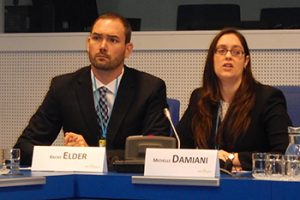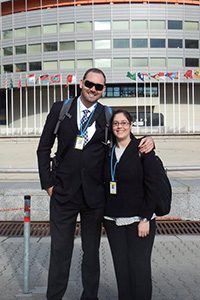Two School of Education special education doctoral students, Brent Elder and Michelle Damiani, presented at the 2016 Zero Project Conference, convened by the Essl Foundation, the World Future Council and the European Foundation Centre at the United Nations Office in Vienna. The conference was held from Feb. 10-12 and highlighted 98 innovative policies and practices concerning inclusive education from 500 contributors representing 70 countries around the world.
 Elder and Damiani have each earned a Certificate of Advanced Studies (CAS) in disability studies from the School of Education. As part of this interdisciplinary program, they took law courses from Arlene Kanter, director of the College of Law’s disability law and policy program. Kanter introduced them to Judy Heumann, the special advisor for international disability rights for the U.S. Department of State, at a disability law symposium in Baltimore in 2013. Heumann encouraged them to pursue their interests in sustainable inclusive schools, and remained in touch.
Elder and Damiani have each earned a Certificate of Advanced Studies (CAS) in disability studies from the School of Education. As part of this interdisciplinary program, they took law courses from Arlene Kanter, director of the College of Law’s disability law and policy program. Kanter introduced them to Judy Heumann, the special advisor for international disability rights for the U.S. Department of State, at a disability law symposium in Baltimore in 2013. Heumann encouraged them to pursue their interests in sustainable inclusive schools, and remained in touch.
It was Heumann who notified Elder about the Zero Project Conference, asking him if he wanted to submit the work done by him and Damiani on inclusive education in Kenya in 2013. Elder consulted Damiani and their Kenyan colleague and co-author, Benson Oswago, who agreed. The group submitted their paper and they were invited to speak as experts on disability in Africa. The presentation was titled, “From Attitudes to Practice: Utilizing Inclusive Teaching Strategies in Kenyan Primary Schools.”
“For me, aside from just being in a building with such palpable history, the most powerful moment of the conference was presenting our work in a room filled with so many world leaders on disability,” says Elder. “They included special advisor Heumann, diplomats from all over the world, members of the Austrian parliament, a prince from Jordan, a princess from Saudi Arabia and directors of NGOs that shape international disability policy.”
Elder taught special education for eight years at a public elementary school in Goleta, Calif., before applying to the School of Education doctoral program. He worked in Bahrain, Thailand, Belize, Cuba and Kenya during his breaks from teaching, and realized he wanted to work on international projects. He is currently conducting his dissertation research on a Fulbright award in rural Kenya.
Damiani’s research agenda reflects a sustained commitment to inclusive teacher education practice and universal design for learning. She is a 2013 recipient of an outstanding university teaching assistant award.
 Damiani feels the conference opened new opportunities, and she and her co-authors have been able to connect with individuals from around the world to discuss future collaborative partnerships. She also feels the conference helped her learn about the implementation status of policies and practices directly from representatives of countries and regions where the work is happening
Damiani feels the conference opened new opportunities, and she and her co-authors have been able to connect with individuals from around the world to discuss future collaborative partnerships. She also feels the conference helped her learn about the implementation status of policies and practices directly from representatives of countries and regions where the work is happening
“Presenting our work at the United Nations among so many world leaders, who share a global commitment to inclusive education and a barrier-free world was most impactful,” says Damiani.
Joanna Masingila, dean of the School of Education, invited Elder and Damiani to travel to Kenya 2013 to conduct a series of workshops focusing on inclusive teaching strategies for a group of teachers in rural Kenya, the basis for their paper and presentation. She says that the School of Education is extremely proud, and encourages other interested students to pursue doctoral studies in the area of special education. The School of Education has been consistently ranked in the top 15 nationally for its special education graduate programs.
Elder and Damiani are invited to a meeting of disability experts at the World Bank in April. Elder believes that these opportunities will help him develop transnational projects in the future, to encourage inclusive education for students with disabilities around the world; while Damiani feels that she learned about other areas of need in her work, for example innovative practices around inclusive education in emergency and refugee situations.
The article they submitted to the UN has recently been published in the International Journal for Inclusive Education.
